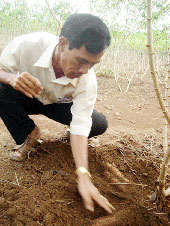2010 seems to be the happiest year of cassava growers because cassava, this year, produces a very good crop and it is sold with good price with a favorable output.
 |
|
Cassava plantation of farmer Ho Sau, Tay Hoa commune, Trang Bom district, produces 30 tons/hectare.
|
*Cassava price rises fourfold.
In 2009, cassava growers were upset because its price decreased sharply, just VND300 to VND400/kg and harvests produce profits not enough for labor payment. This year, however, when the harvest came, the price rose markedly. At present, cassava root price in fields is VND1,500 to VND1,600/kg, a fourfold increase over 2009. With this price, when subtracting expenses, farmers earn profits of VND20 million to VND22 million/hectare, which is the highest profit rate ever. Particularly, some households raise yield to about 30 tons/hectare, bringing in profits of over VND30 million/hectare.
Ho Sau, Tay Hoa commune, Trang Bom district couldn’t hide his happiness and said: “After planting cassava in some tens of years, for the first time, I saw such a high cassava price. This year, my family grows 100 hectares of cassava, with average yield of 30 tons/hectare and when subtracting expenses, I got profits of VND30 million/hectare. With 100 hectares, profit is about VND3 billion.” Le Van Hoa, Xuan Hoa commune, Xuan Loc district, said: “This year, cassava is priced highly and sold easily. Traders come to fields with good yield of cassava to buy for VND1,700/kg. Seeing cassava priced highly and easily sold, I and many farmers felt sorry for leaving some areas empty.”
Similarly, many cassava farmers in districts such as Vinh Cuu, Trang Bom, Nhon Trach said: “For the first time, cassava growers are completely happy for both crops and price are good. Most of cassava growers are poor, so the fact that cassava price rises fourfold helps them earn a high income to stabilize their lives. Price of fresh cassava roots rises, making slices of dried cassava up to VND4,200 to VND4,300/kg and manufacturers of cassava slices earn high profits from hoarded products."
*Should farmers change to grow cassava together?
Cassava price rises dramatically, making a lot of farmers in the province have a tendency to increase their plantation in the coming crop for investment capital and time needed for taking care of it are not much. However, according to consideration of some economy experts, cassava price these days rises sharply because in 2009 cassava price decreased drastically, making many farmers suffer losses and change to grow other plants. That led to deficit in supply. If lots of farmers increase cassava plantation together, it is difficult to ensure this high price in the next crop.
The Deputy Director of the provincial Department of Agriculture and Rural Development Phan Minh Bau noted: “Cassava is not encouraged to grow by Ministry of Agriculture and Rural Development and the province because growing cassava can make soil poor and impoverished. Therefore, farmers should maintain cassava plantation and apply science and technology to raise yield. For regions with sufficient water sources, farmers should change to grow short-term or long-term crops."
At present, Dong Nai has about 17,000 hectares of cassava plantation with average yield of over 22 tons/hectare. The locality has huge area of cassava plantation, including Vinh Cuu, Xuan Loc, Long Thanh and Trang Bom districts, etc. Although this is the first year that cassava growers earn profits (over VND20 million/hectare), their income can increase twofold or threefold if they move to grow corns and beans and soil in this region has water. Moreover, if growing corns, beans, farmers will not worry much about the output because with such a Vietnam’s corn and bean yield, supply does not meet demand. (yearly Vietnam imports cassava with millions of dollars). Besides, if beans are intercropped with corns, soil can be improved.
For regions with water shortage where it is impossible to change to grow other plants, instead cassava, farmers should grow new varieties and apply technology in production to raise yield. In fact, some farmers in Trang Bom district didn’t experience much difficulty in increasing cassava yield to 30 tons/hectare. According to agricultural engineers, if growing new varieties and taking care of it well, farmers can have about 50 tons/hectare.
Source: Dong Nai Newspaper, translated by Hoai Thu
